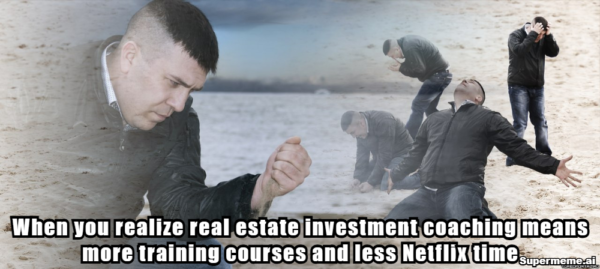A no-nonsense guide makes quite a bit of difference between success and failure in the dynamic world of real estate investing. Real Estate Investment Coaching and Mentoring have lately come out as strong tools by which both novice and experienced investors may successfully lead their way through property markets, financing options, and investment strategies in a complicated maze. The article explores the very important role coaching and mentoring play in the real estate investment setting to help investors adapt to market trends and realize financial goals.
The Value of Coaching and Mentoring in Real Estate Investing
Real estate investment has huge potential for good returns, yet it is equally replete with risks and challenges. Most successful investors always attribute their successes to the mentors and coaches who guided them through the earlier stages of their careers. Sometimes, finding a mentor or coach and being able to work well with them can prove challenging; however, their reward often proves well worth it.

Benefits of Having a Mentor or Coach
- Accelerated learning curve
- Access to industry insights and best practices
- Networking opportunities
- Accountability and motivation
- Risk mitigation by experienced guidance
The mentors and coaches bring immense on-site knowledge and acumen that can only be obtained through years of experience. Most of them may have seen different highs and lows in property investment, and they may have managed many clients in various kinds of deals. This, again, could help the mentee avoid committing general mistakes and make informed decisions.
Right Mentor or Coach
It is very daunting to find a real estate investment mentor or a real estate investment coach. The question that flows in many investors’ minds is where to find these phantom figures who can guide them on the road to success. Here are some good ways to connect with your potential mentors:
- Local Real Estate Investor Associations: This is a great networking opportunity. Local REIA meetings come together to meet some of the seasoned investors who may be interested in mentoring.
- Events in networking: Conferences, seminars, and other real estate local meetups are excellent for networking with your potential mentor.
- Social networking sites: Twitter and LinkedIn have hosts of real estate mentors and coaches who share knowledge and offer their services.
- Real estate agents: Seasoned real estate agents dealing with investors can be of good luck and insight.
When looking for mentors or coaches, care should be taken, and one needs to be choosy. Beware of the self-touted gurus who tend to make more money from course sales than from actual real estate investing. Seek out mentors who are active in your local market and have a successful record of investments.
The Mentor-Mentee Relationship
Creating a successful mentor and mentee relationship requires dedication and consideration for both parties. These are some of the things you may consider to be important:
- Respect Their Time: Come prepared with your questions, and don’t waste your mentor’s time with less-than-important things.
- Give Back to Them: Sometimes, there will be projects you can work on for them or for the business they own. These can include working on projects with them or simply coming up with new ideas.
- Constant Learning: Your desire to learn and grow is important to continuously act on and then apply.
- Building Trust: Over time, develop a trusting relationship. The mentor will likely invest in those mentees showing dedication and potential.
Coaching vs. Mentoring
While often used interchangeably, coaching and mentoring have distinct characteristics:
| Aspect | Coaching | Mentoring |
| Focus | Specific skills or goals | Overall personal and professional development |
| Duration | Usually short-term | Often long-term |
| Structure | More formal, with defined objectives | Less formal, evolving based on mentee’s needs |
| Expertise | Coach is an expert in a specific area | Mentor shares broader life and career experiences |
| Payment | Often paid service | Usually unpaid, based on goodwill |
 How Real Estate Investment Coaching and Mentoring Can Help One Through Market Trends
How Real Estate Investment Coaching and Mentoring Can Help One Through Market Trends
Market trend guidance is one of the most precious resources that come with coaching and mentoring in real estate investments. A seasoned mentor or coach would, therefore, help the investor contextualize emerging market data, identify new opportunities, and adjust his strategies to suit changes in the market. Here’s a table summarizing the key roles of coaching and mentoring in this area:
| Role | Description | Impact on Investor |
| Market Analysis | Providing insights on current market conditions and trends | Helps investors make informed decisions about when and where to invest |
| Risk Assessment | Evaluating potential risks associated with different investment strategies | Enables investors to mitigate risks and protect their investments |
| Opportunity Identification | Spotting emerging trends and lucrative investment opportunities | Allows investors to capitalize on market shifts and maximize returns |
| Strategy Adaptation | Guiding investors in adjusting their strategies to align with market changes | Ensures investors remain competitive and profitable in changing markets |
| Economic Interpretation | Explaining the impact of broader economic factors on real estate markets | Helps investors understand the bigger picture and make long-term decisions |
| Local Market Expertise | Providing specific insights into local market dynamics | Enables investors to make targeted investments in promising areas |
| Technology Integration | Advising on the use of new technologies in real estate investing | Keeps investors up-to-date with tools that can give them a competitive edge |
| Networking Facilitation | Connecting investors with key players in the industry | Expands investors’ access to deals, partnerships, and resources |
 Real Estate Investment Coaching and Mentoring: How to Maximize the Gained Potential
Real Estate Investment Coaching and Mentoring: How to Maximize the Gained Potential
In light of the above, investors can only fully benefit from coaching or mentoring if they:
- Set Clear Goals: Firmly establish what you want to achieve from the mentorship or coaching relationship.
- Be Receptive to Feedback: Invite constructive criticism and be ready to change your approach upon advice from your mentor.
- Take Action: Implement strategies and techniques that were provided by the mentor or coach. Commitment: Demonstrate consistent communication and follow through with commitments made on coaching calls.
- Monitor Progress: Keep a log of how one is growing and achieving results to measure the effectiveness of the mentorship experience.
- Give Back: Pay it forward with your experience and consider mentoring others in turn as a way to give back to the real estate investing community.

The Impact of Coaching and Mentoring on the Success of Investment
Coaching and mentoring in real estate investment can impact investors about the level of their success. The following are some areas in which investors require guidance:
1. Making Financial Decisions
The mentors or coaches can help investors establish a solid financial foundation from which they can launch the real estate enterprise. This will entail the following:
Creating realistic budgets for purchasing the property and renovation
Understanding the available options for financing and selecting the most appropriate ones
Develop methods for creating and managing investment portfolios.
2. Market Analysis and Property Selection
With the guidance of an experienced mentor, an investor will know how to:
Analyze market trends and determine which areas have a high potential for investment
How to look at properties and determine their viability for investment
Conduct due diligence before making purchase decisions.
3. Negotiation Skills
Coaches can help investors in developing negotiation skills, which are the heart of any transaction in real estate. This comprises:
Methods of negotiating the purchase price
Dealing with sellers, agents, and other stakeholders
How to deal with complex deal structures.
4. Risk Management
Mentors can advise investors on how to carry out the most effective risk management strategies, such as:
Diversification of investment portfolios
Identify and reduce numerous types of risks associated with the real estate industry
Include backup plans when the market begins to head south.
5. Networking and Relationship Building
Coaches and mentors will assist investors in developing and nurturing critical relationships within the real estate industry as follows:
Meeting other investors, real estate agents, and service providers
Building credibility in the local real estate marketplace
Finding joint venture partners.

Real Estate Investment Coaching and Mentoring Pitfalls
Even given all the powerful positives, there are some potential challenges to coaching and mentoring to be considered:
- Finding a Good Fit: Not every mentor or coach will be a good fit for every investor. You need to find someone whose experience and teaching style are relevant to your needs and goals.
- Time: A mentoring relationship cannot work unless both the mentor and the mentee dedicate adequate time to the relationship.
- Setting Boundaries: The boundaries and expectations of the mentoring relationship should be clear from the outset to avoid misunderstanding.
- Too Much Guidance: While mentors and coaches provide a great deal of insight, it is also worth noting that investors shouldn’t become too reliant on advice given by a mentor.
- Costs: Some coaching programs are very expensive, and one should be able to balance out that the cost justifies the benefits accrued.
Conclusion
Real estate investment coaching and mentoring can be quite instrumental in guiding investors through the always complicated world of property investing. They guide on market trends, investment strategies, and risk management that greatly reduce an investor’s learning curve and possibly raise their success rate.
The secret to success in such a relationship, be it mentoring or coaching, lies in finding a good match, clarity over goals, and a commitment by both parties to learn and grow. There are indeed challenges, but the possible benefits of having a seasoned guide on this real estate investment journey essentially outweigh the drawbacks.
It is within this sea of change that the real estate market crystallizes a number of factors, which make the value of seasoned mentorship even more clear. The investors who make the most of insight and experience from seasoned professionals through a coaching and mentoring relationship will include those best suited for moving with the changing market conditions, identifying lucrative opportunities, and building successful and sustainable real estate investment portfolios. By better guiding one down the path of today’s market trends, mentors and coaches can assist real estate investors in acquiring the type of skill and knowledge that will serve them well in the dynamic world of property investment for many years to come.
FAQs
What is the difference between real estate investment coaching and mentoring?
Coaching generally is short term, focusing on specific skills or defined goals, and tends to be a paid service. Mentoring is long term, focusing on overall personal and professional development, and tends to be an unpaid activity based on goodwill.
How do I locate a real estate investment mentor or coach?
You can source suitable mentors or coaches through a local Real Estate Investor Associations (REIA), networking events, social media platforms such as LinkedIn or Twitter, or by getting in touch with experienced agents that specialize in working with investors.
What are some key advantages of having a real estate investment mentor or coach?
Some of its key advantages would include the fact that it would provide an accelerated learning curve for people. It exposes one to industry knowledge and best practices. It provides network opportunity, accountability, and motivation, as well as risks lessened through the experience of your guide.

